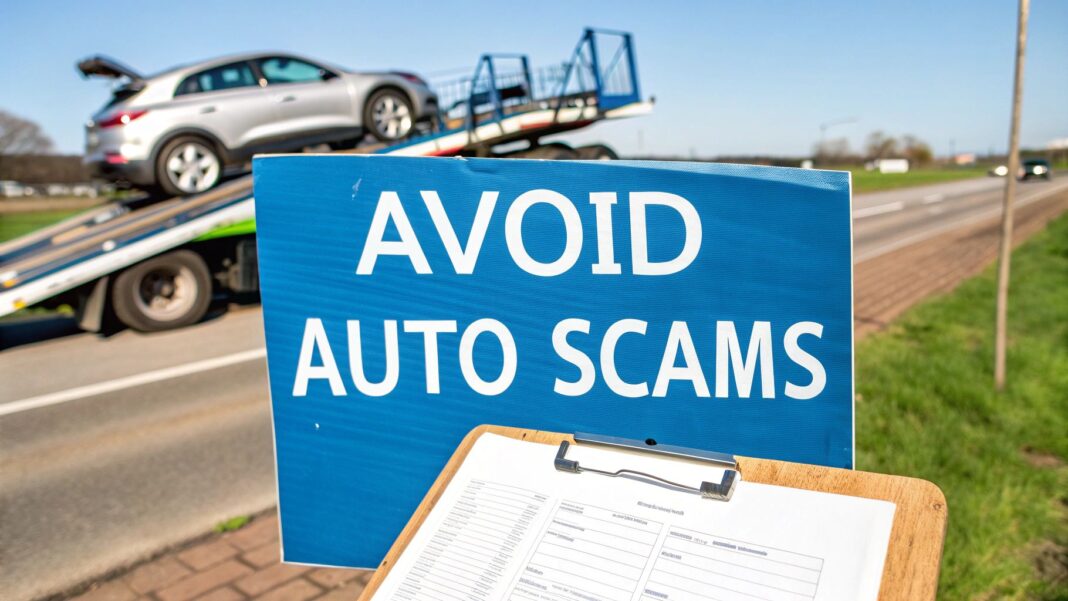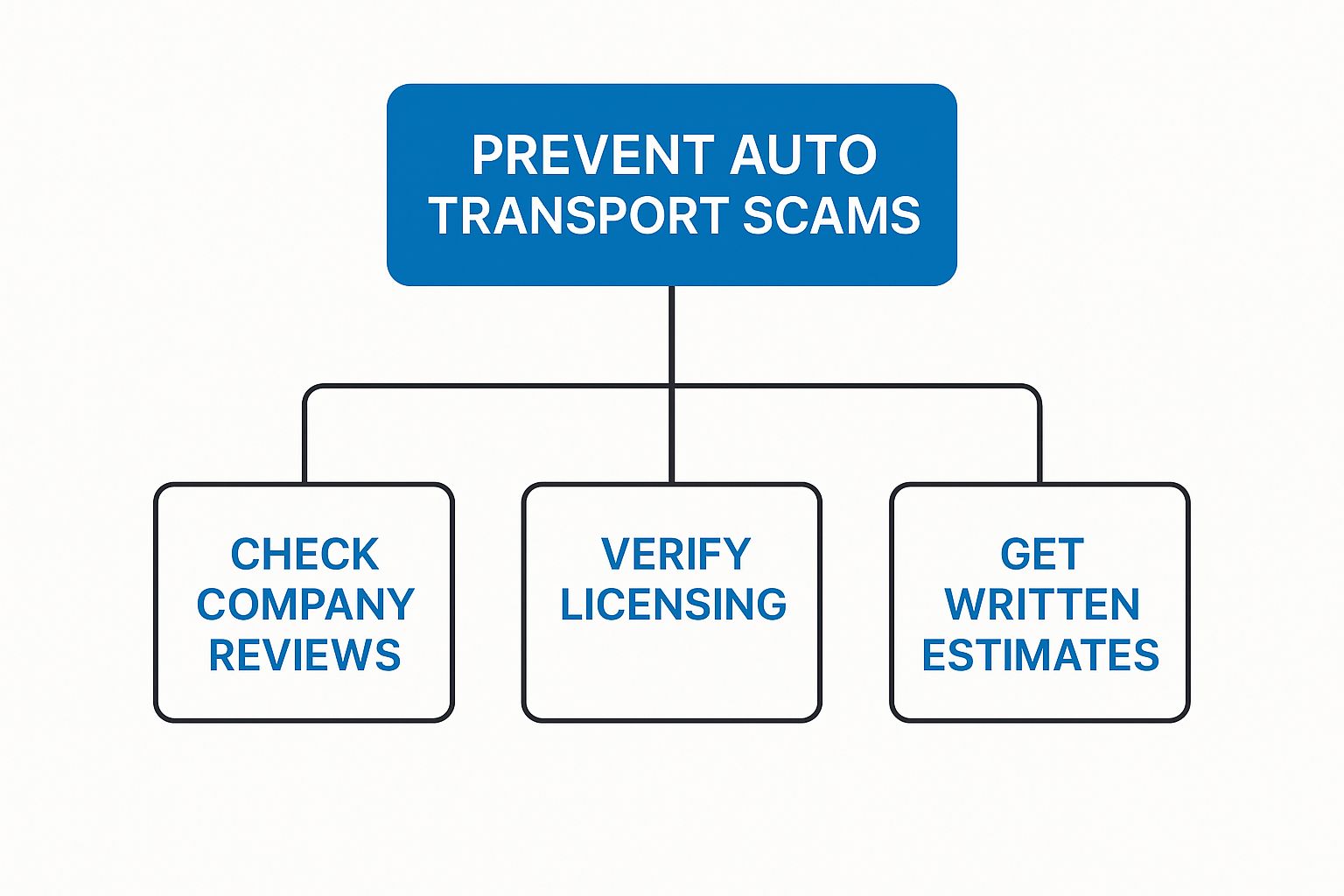
Shipping a car should be a straightforward process, but the industry has a dark side where clever auto transport scams can turn a simple service into a nightmare. These schemes range from deceptive pricing tactics to outright fraud, often leaving consumers stressed and out of pocket.
This guide provides actionable insights to help you identify threats and ensure a smooth, secure vehicle shipment.
Why Shipping Your Car Can Feel So Risky

Handing over the keys to a valuable asset requires a leap of faith. The primary risk lies with dishonest operators who prey on customers unfamiliar with the auto transport industry. The process can feel like a gamble, leaving you to worry about whether your car will arrive on time, in good condition, or if the price you agreed to will be the price you actually pay.
While the industry has many reputable companies, its operational structure can be exploited by scammers. You are not just buying a product; you're purchasing a complex logistical service, and it's easy to get lost in the details where fraudulent companies thrive.
Common Tactics to Watch For
Most scams capitalize on this complexity, starting with an offer that seems too good to be true. Here are the most common tactics fraudulent operators use:
- Bait-and-Switch Pricing: A company provides an extremely low quote to secure your booking. Once they have your vehicle, they inflate the price with unexpected fees, leaving you with little choice but to pay.
- The Broker Shuffle (Double Brokering): You hire a company based on their reputation, but they pass your shipment to another, often less reputable, carrier without your knowledge. When a problem arises, both parties deny responsibility.
- Zero Transparency: Vague contracts, an inability to provide proof of licensing or insurance, and evasive answers to direct questions are major red flags. Legitimate companies operate with full transparency.
At their core, most auto transport scams follow a simple formula: attract the customer with an urgent, lowball price, and then leverage their commitment once the vehicle is in their possession. The goal is to make you feel trapped and powerless.
In addition to financial risks, the threat of vehicle theft is a valid concern. Reviewing general tips for protecting your car from theft can offer additional peace of mind. This guide will provide the specific knowledge you need to identify and avoid transport-related scams.
A Quick Look at Common Auto Transport Scams
To help you spot potential scams early, here is a breakdown of the most frequent schemes. Use this as a quick reference for identifying red flags before you commit.
| Scam Type | How It Works | Actionable Red Flag |
|---|---|---|
| Bait-and-Switch | The company offers a price far below market value to get your booking, then adds hundreds in "unexpected" fees later. | An initial quote that is significantly lower than quotes from multiple other companies. |
| Upfront Deposit Demands | A fraudulent company asks for a large deposit or full payment before a carrier has been assigned to your shipment. | Pressure to pay a large sum before service details are confirmed in writing. |
| Insurance Deception | The company claims "full coverage" insurance that is either nonexistent or carries a massive deductible you must pay. | Refusal to provide a verifiable Certificate of Insurance for your review. |
| Vehicle Hostage | The carrier refuses to release your vehicle at its destination until you pay more than the contractually agreed-upon price. | Vague contract terms regarding final payment or unexpected Cash-on-Delivery (C.O.D.) demands. |
Recognizing these patterns is the first and most crucial step. If something feels off, trust your instinct and investigate further before handing over your keys.
How a Low Quote Turns into a High Price
The "bait-and-switch" is one of the most prevalent auto transport scams. It begins with an attractively low price—often hundreds less than competitors—designed to get you to sign a contract immediately.
This tactic creates a high-pressure situation similar to a mechanic providing a low verbal estimate and then tripling the bill once your car's engine is disassembled. You feel stuck. This is precisely the leverage scammers rely on.
The Anatomy of the Switch
The "switch" occurs after you are contractually committed and your vehicle is in transit. You will receive a call or email detailing new, non-negotiable fees, often disguised with official-sounding jargon.
- Fuel Surcharges: They may claim a sudden spike in fuel prices that was not included in your original quote.
- Carrier Readjustment Fees: The broker might blame the driver, stating the carrier demanded more money last-minute to accept the shipment.
- "Inconvenience" Charges: This is a catch-all for fabricated costs, such as needing a smaller truck to navigate your street.
These charges are almost always fraudulent. The broker knew from the beginning that the initial low price was unrealistic and that no legitimate carrier would accept the job for that amount. The strategy is to lure you in with an impossible quote and then hold your vehicle until you pay the true market rate plus a dishonest markup.
Price switching is effective because once your car is on a truck, your leverage is significantly reduced. In many cases, carriers can legally hold your vehicle until the bill is paid, leaving you feeling powerless. You can find more examples of these schemes in this list of common auto transport scams at CompareTheCarrier.com.
Protecting Yourself from the Price Hike
The most effective way to avoid this scam is to be skeptical of any quote that is an outlier. Actionable Step: Obtain at least three to five quotes from different companies. If one is dramatically lower than the others, it is a major red flag. The price for a standard open transport car shipping service should be relatively consistent among reputable providers.
Always get everything in writing. Insist on a contract that explicitly states the quoted price is the final, binding price. Read every word of the Bill of Lading (BOL) before signing and look for clauses that permit additional charges. A reputable company will provide a transparent, all-inclusive quote and be upfront about any legitimate potential costs from the start. Do not let anyone pressure you into a bad deal.
The Hidden Dangers of Double Brokering

As auto transport scams become more sophisticated, one of the most damaging is double brokering. In this scenario, you hire a seemingly reputable company, confident in their insurance and service promises.
However, without your knowledge, that company hands your shipment off to a different, often cheaper and unvetted, carrier. This is not a simple partnership; it is a deceptive hand-off that breaks the chain of accountability you believed you had.
If your vehicle is damaged, delayed, or stolen, you are thrown into a logistical nightmare. The original broker blames the new carrier, who in turn claims they have no contract with you. Both parties deny responsibility.
Why Accountability Vanishes
The primary threat of double brokering is the complete loss of oversight. The broker you paid pockets the price difference and absolves themselves of responsibility, leaving you to deal with an unknown entity.
This leaves you with little to no recourse. Your car could be with a driver who has inadequate insurance, a poor safety record, or is not even a legitimate carrier. It is like hiring a trusted contractor who then subcontracts the entire job to an unknown individual from an online ad.
In this type of scam, the original carrier transfers the order to another carrier without customer consent, often resulting in significant delays, loss, or even outright theft. Scammers have also used phishing tactics by posing as legitimate carriers to intercept shipments. For more details on these evolved schemes, you can explore the insights on how auto transport scams work at Reindeerauto.com.
Real-World Consequences and How to Avoid Them
When a shipment is double-brokered, your car can effectively disappear from your control. The company you hired may stop responding, and you likely won't have the contact information for the person who actually possesses your vehicle.
This scam thrives on a lack of transparency. Actionable Step: Before signing a contract, ask the company directly: "Will your company manage my shipment from start to finish, or do you re-broker to other carriers?" A legitimate company will be upfront about their process. Services like door-to-door auto transport can also reduce risk by offering a more direct chain of custody.
Finally, your last line of defense is the Bill of Lading (BOL) on pickup day. Actionable Step: The company name on the BOL must match the company you hired. If a different carrier's name is on the paperwork, do not release your vehicle. Stop the process and contact your broker immediately. This simple check can prevent you from losing control of your car.
Spotting the Red Flags of a Scam Shipper
Protecting yourself from auto transport scams is about knowing what to look for before signing a contract. It's about spotting the subtle signs of trouble that fraudulent shippers often reveal.
Most scams begin with an unbelievably low price, followed by aggressive sales tactics. The scammer's goal is to create urgency, pushing you to commit before you have time to perform due diligence. They want you to move so quickly that you overlook the obvious warning signs.
This infographic outlines the crucial first steps to keep you safe.

The most important actions are verifying the company's legitimacy and getting a comprehensive written agreement. Do not skip these steps.
Vague Contracts and Unprofessional Communication
A legitimate company will provide a clear, detailed contract that outlines all terms, costs, and insurance details. Scammers thrive on ambiguity. Their contracts are often intentionally vague, full of confusing jargon, or missing key information like final costs and delivery windows.
Another significant red flag is their communication style and online presence. A poorly designed website, business emails from generic providers (like Gmail or Yahoo), or the absence of a physical address are all signs of a transient operation that could disappear after receiving your payment.
A refusal to provide a valid Motor Carrier (MC) or Department of Transportation (DOT) number is an absolute dealbreaker. Every legal interstate carrier must have these, and a legitimate company will provide them without hesitation. Hiding this information is like a doctor refusing to show you their medical license.
Suspicious Payment Demands
How a company requests payment can reveal its legitimacy. Be extremely wary of any shipper demanding a large deposit—or worse, the full payment—before your vehicle is even assigned to a carrier. This is a classic tactic used by scammers with no intention of shipping your car.
Here is a list of payment red flags:
- Pressure to use untraceable methods: Scammers prefer wire transfers, cash apps (Venmo, Zelle), or cryptocurrency because these transactions are nearly impossible to reverse.
- No credit card option: Reputable businesses almost always accept major credit cards, which offer fraud protection and the ability to dispute charges. A company that only accepts untraceable payment methods is a major risk.
- Large, non-refundable deposits: While a small, reasonable deposit can be standard, a company demanding a large, non-refundable sum is more interested in your money than in providing a service.
Ultimately, trust your intuition. If the communication feels unprofessional, the promises seem unrealistic, or the payment process is suspicious, walk away. There are many honest, professional auto transporters who operate with integrity.
Red Flag Checklist Legitimate vs Scam Company
| Attribute | What a Legitimate Company Does | What a Scam Company Does |
|---|---|---|
| Licensing | Readily provides their MC and DOT numbers for verification. | Hides, refuses to provide, or gives fake MC/DOT numbers. |
| Contracts | Offers a clear, detailed written contract outlining all terms and costs. | Provides a vague contract or no written agreement at all. |
| Payment Requests | Accepts credit cards; may ask for a small, reasonable deposit. | Demands large upfront payments or the full amount via wire or cash app. |
| Online Presence | Has a professional website, corporate email, and a verifiable physical address. | Uses a poor-quality website, generic email, and has no physical address listed. |
| Sales Tactics | Provides a clear quote and gives you time to consider it. | Uses high-pressure tactics and "too-good-to-be-true" lowball prices. |
| Insurance | Provides clear proof of insurance coverage upon request. | Is evasive about insurance details or cannot provide a certificate. |
This side-by-side comparison helps illustrate the key differences. A legitimate business is built on transparency, whereas a scam thrives on secrecy and pressure.
Your Vetting Checklist for Secure Car Shipping

Now that you can identify red flags for auto transport scams, it's time to implement a proactive vetting process. This checklist provides a systematic plan for evaluating any shipping company before you commit.
This due diligence is not about being cynical; it's about being a smart consumer protecting a significant asset. A consistent vetting process is the most effective way to ensure your vehicle is handled by a reputable provider.
First Things First: Verify Federal Registration
This is the most critical step. Every legitimate auto transport company operating across state lines—whether a direct carrier or a broker—must be registered with the Federal Motor Carrier Safety Administration (FMCSA). There are no exceptions.
Actionable Step: Before proceeding, request the company's Motor Carrier (MC) and U.S. Department of Transportation (DOT) numbers. A reputable company will provide them immediately. Then, use the official FMCSA Company Snapshot tool online to verify their operating status, safety record, and insurance information.
A company that will not provide its MC or DOT numbers should be dismissed immediately. If the numbers are invalid, inactive, or not authorized for transporting vehicles, walk away. This is an undeniable sign that the company is not operating legally.
Putting together a solid vetting checklist is really all about investigation. It’s helpful to understand the importance of due diligence as a general concept.
Dig Into Reviews and Get a Look at the Contract
Once you've confirmed a company's legal status, investigate its reputation. Actionable Step: Check customer reviews on multiple third-party platforms like the Better Business Bureau (BBB) and Google Reviews. Look for patterns in complaints, such as bait-and-switch pricing, persistent delays, or poor communication.
Never sign a contract without reading it thoroughly. Actionable Step: Insist on receiving a complete copy of the agreement or Bill of Lading upfront. A professional company provides a clear, detailed document. Scrutinize the fine print for vague language or clauses that allow for price increases.
Finally, verify their insurance personally. Do not accept a verbal confirmation of being "fully insured." Actionable Step: Request a copy of their insurance certificate. Confirm that it is current and that the coverage is sufficient to protect the full value of your vehicle.
Taking these steps puts you in control of the shipping process. If you are ready to find a trustworthy provider, exploring your options for professional car transport is a great place to start.
Understanding the Growing Threat of Freight Fraud
https://www.youtube.com/embed/IoKTR4QR6-w
To fully appreciate the risks, it's important to understand that auto transport scams are part of a larger, more organized criminal trend known as freight fraud.
This is not a minor issue; it is a sophisticated criminal enterprise affecting everything from consumer goods to vehicle shipments. Scammers are becoming more organized and are using technology to make it harder to distinguish legitimate companies from fraudulent ones.
The Alarming Rise in Fraudulent Activity
Recent data highlights the severity of the problem. The Transportation Intermediaries Association (TIA) reported over 1,600 fraud incidents in a single six-month period, a 65% increase over the previous record.
The hardest-hit sector is truckload freight—the category that includes your car. You can dig into the specifics in the TIA's State of Fraud report. This explosion in fraud demonstrates that scammers are actively targeting the shipping industry, using the convenience of online booking to their advantage.
The key takeaway is that the risk is real and growing. This is no longer about avoiding a few bad actors; it's about protecting yourself in an environment where sophisticated fraud is increasingly common.
Why Auto Transport Is a Prime Target
Several factors make auto transport a magnet for scammers:
- High-Value Assets: A car is one of the most valuable possessions for most people, representing a significant potential payday for a scammer.
- Emotional Transactions: People often ship cars during stressful life events like moving, starting a new job, or sending a child to college. Stress can lead to missed red flags and vulnerability to high-pressure sales tactics.
- Lack of Industry Knowledge: Most people ship a car infrequently. This inexperience makes it easy for scammers to exploit a customer's lack of knowledge about industry processes and norms.
This combination of high stakes and low familiarity creates a perfect environment for fraudsters. That is why conducting thorough due diligence, as outlined in this guide, is not just advisable—it is essential to avoid becoming another statistic.
Common Questions About Auto Transport Scams
Knowing how to spot auto transport scams is the first step. Here are answers to common "what if" scenarios to help you ship your car with confidence.
What If They Change the Price Mid-Trip?
This is a classic "vehicle hostage" situation: the driver demands more money during transit or at delivery.
Your signed contract is your most important tool. Remain calm and refer to the binding quote you both agreed upon. Politely but firmly state that you will only pay the contracted amount. If they refuse to release your vehicle for the agreed-upon price, inform them that you are filing a complaint with the Federal Motor Carrier Safety Administration (FMCSA) and the Department of Transportation. Document every conversation in writing. If they still refuse, file a police report for theft.
How Do I Know a Company Is Legit?
Verifying a company's legitimacy is straightforward. Every company legally transporting vehicles across state lines must be registered with the FMCSA.
Actionable Step: Ask for their MC (Motor Carrier) or DOT number upfront. If they hesitate or refuse, end the conversation. Once you have the number, use the official FMCSA website's search page to look them up. This free tool allows you to verify their operating status, insurance coverage, and safety history.
What’s the Deal with Deposits?
This can be confusing, as some reputable companies require a small deposit while scammers demand large upfront payments. Here is how to tell the difference.
A scammer will often demand a large portion of the total cost before they've even assigned a driver to your vehicle. They'll also push for untraceable payment methods like wire transfers, cash apps, or even gift cards.
A legitimate deposit is typically a small, reasonable fee used to secure your booking. Crucially, it should always be payable by credit card. Paying with a credit card provides a financial safety net, giving you the ability to dispute the charge if the company fails to deliver its promised service.
When you need a shipping partner you can trust, count on We Will Transport It. Our team is committed to transparent pricing and secure, reliable vehicle transport nationwide. Get your free, no-obligation quote today and ship with confidence. Learn more at https://www.wewilltransportit.com.





